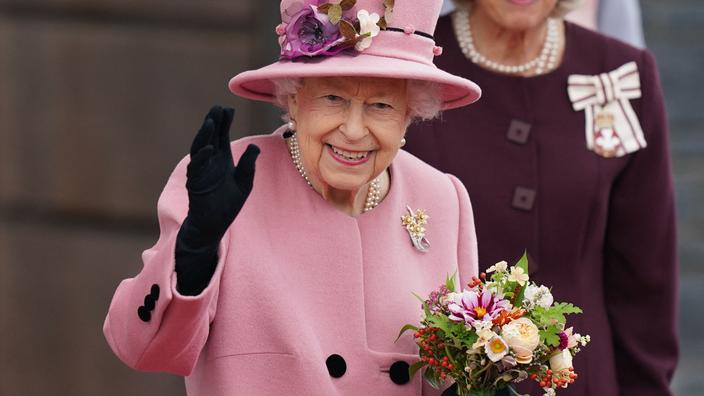“
We have a date with your fiancé.
"
Do you want some vinaigrette for your amuse-bouche?"
Enjoy your lunch !
»... Here are phrases in English with a... very French flavour.
Many French words have slipped into the British dictionary.
"
Couturier
", "
à la carte
", "
fiancé
", "
trompe-l'oeil
"... We find the lexical field of food with the words "
à la carte
", "
brioche
", "
crème brûlée
", without forgetting the famous “
croissants
”.
The vocabulary of fashion is not left out with the "
bun
" or the "
neckline
".
Ditto for art:
"fine arts", "masterpiece"
and
"avant-garde".
But that's not all.
“
These words represent only a small part of English words borrowed from French
,” notes Anthony Lacoudre, linguist and author of
The Incredible History of French Words in English
(Walworth Publishing, 2015).
Read alsoFive cooking words that the English love to say... in French
"Out of 60,000 English words, we can say that more than 60% [...] find their roots in French or Latin
", analyzes for his part the linguist Jean Pruvost, author of
Story of the French language
(Tallandier, 2020 ).
But where do they come from?
Legacy of William the Conqueror
For centuries, France and the United Kingdom have passed the buck.
Who is the first invader?
Who was the first to declare war?
And with that, who is influencing whom?
If we find many English words in the language of Molière, the English are not left out.
And the legacy dates back to the 11th century.
To understand this, you have to go back to 1066, the year in which the Duke of Normandy, known as William the Bastard, became King of England after the Battle of Hastings.
From the top of his steed, he adorned himself with the name, now retained in the history books, of “
William the Conqueror
”.
The conquest of a country was accompanied by the transmission of a culture and a language.
"
For three centuries, this lexicon of French origin will color the English language
", continues Jean Pruvost, for
Le Figaro
.
Read also“
Black Friday
”, “
Happy Hour
”… These Anglicisms that are invading commerce
“
We can really speak of a linguistic invasion,
insists Anthony Lacoudre.
No living language has inspired another language so much.
» The 10,000 new French words skim in reverse the «
old English
» to become the «
middle English
».
Thus, everyday words such as "
cardinal
", "
image
", "
miracle
", "
fruit
" appeared in the 11th century... Other words are directly derived from French and pronounced with a Norman accent (the one spoken by entire court of William the Conqueror), as "
war
" says "
werre
" thus giving "
war
(war in English) or even “
” pronounced “
poquette
” or “
” in English.
“Guillaume the Conqueror imposes French as the language of the court and the elite,
adds Anthony Lacoudre.
French becomes the language of writing, all official documents, invoices were written in French and this will last until the end of the Middle Ages, until Richard III.
An influence which extends until the 17th century, French being then, pushed by the influence of the Renaissance, considered as the universal language of elegance and culture.
This is why French words around savoir-vivre, fashion and gastronomy have infiltrated the English dictionary.
A massive introduction that linguist Anthony Lacoudre estimates at 12,000 French words.
“
It's the second salvo,
” he continues.
Thus are imported the words “dessert”, “mustache”, “alphabet”, “turbulence”, “fragile”, “grenade”, “bomb”
» To what do we owe them?
“
To the prestige of the French language at the time!
»
However, the following century marked a turning point.
After the Glorious Revolution of 1688, the United Kingdom opted for a constitutional monarchy, a regime for which the philosophers of the Enlightenment were to be passionate and borrow the British language.
This is how the words "
clubs
", "
budget
", "
meeting
" will in turn cross the Channel to the continent.
The industrial revolutions follow with their “
railway
”, “
tender
”, “
ballast
”.
Anthony Lacoudre nuance however:
"The tendency is reversed but it should be noted that many are the words then imported from English which come from French
".
This is for example the case of the "
budget
“, coming from “
bougette
”, the small purse of money which was carried on the side of the horse and “
moved
” to the rhythm of the gallops.
In the 20th century, American power took hold and
the “American way of life
” turned heads.
English words continue to flow into the French vocabulary.
“
Rock'n'roll
”, “
dancing
”, “
chewing-gum
” then make their entrance before giving way to the words of new technologies.
To name just a few: “
”, “
spam
”, “
laptop
”.
Then it's the turn of the Start-up Nation to cross the Atlantic, bringing French its share of "
conf-call
", "
open-space
" and "
brainstorming
".
A Franglais which is not without causing serious problems... Shocking!





